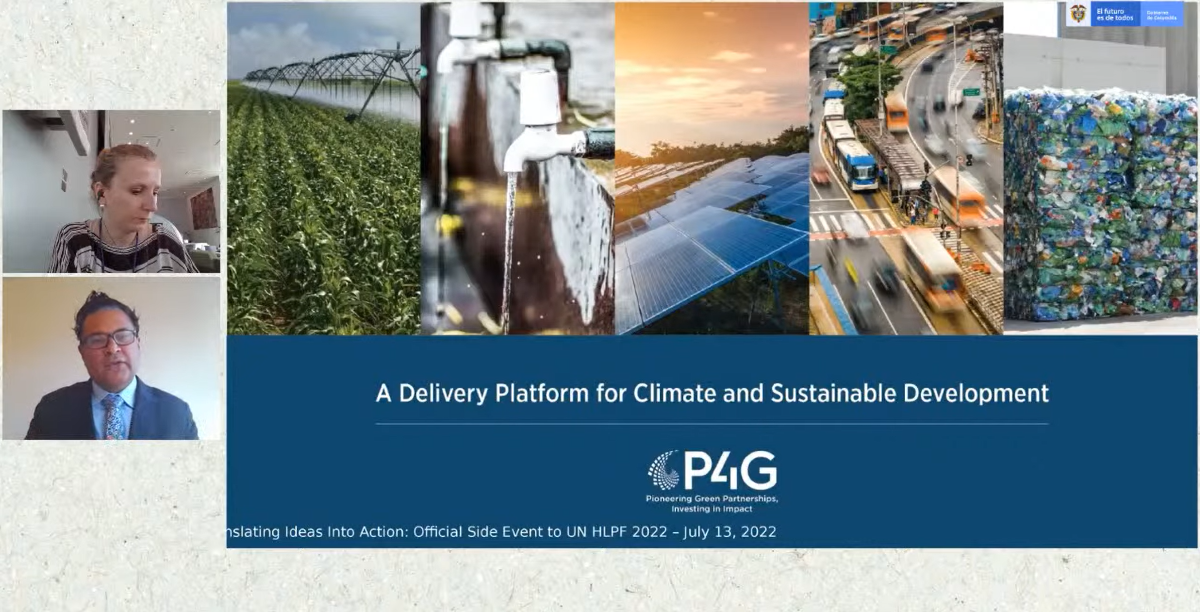How Partnerships are Translating Ideas into Action

Subject
Events
Country
Publication Date
2022-07-19
About
On July 13, the Republic of Colombia, Denmark and the Republic of Korea co-hosted the United Nations (UN) High Level Political Forum 2022 side event, “Translating ideas into action: Cooperation between state and non-state actors to fully achieve the SDGs.” The event illustrated the importance of multistakeholder interactions to meet the UN Sustainable Development Goals (SDGs), while providing tangible examples of how cooperation has advanced sustainable outcomes.
Noting the importance of partnerships in leading green growth initiatives, Ian de Cruz, P4G Global Director, shared P4G’s approach to investing in market-based solutions in low- and middle-income countries. In his presentation, de Cruz highlighted P4G partnerships Africa GreenCo and Food Upcycling for the Future, sharing how they’ve collaborated with P4G partner country governments and the private sector to refine their business models.
Mireia Villar Forner, Resident Coordinator at UN Colombia, noted that the 2030 agenda provides an opportunity to reach beyond the UN and work with new partners to achieve universal goals. The goals can’t be achieved by the government alone. Scientists, culture, media—the entire world needs to be involved. The most important characteristic making these partnerships work is the shared belief in sustainable development, and that we’re all needed in the movement. “We’re pursuing these partnerships because we need scale,” Villar Forner said. “We need acceleration of results and we need to transform our current systems …. When we achieve scale, we’re able to protect the public goods [and] leverage public responses within the market in the market itself. We transform when we’re able to bring new perspectives, thinking and scientific evidence in the design of these solutions that we need. And we accelerate when we act together.”
Changsoo Kim, Counsellor at the Embassy of the Republic of Korea to the United States, drew on his experience preparing the 2021 P4G Seoul Summit. He discussed how Korea has emerged from the COVID-19 pandemic and rebuilt the Korean economy while pursuing the country’s green agenda, climate goals and the SDGs. As Korean companies got on board and started aligning with climate change efforts, the coordination among civil society, business and government moved in the same direction.
Expanding on the discussions about partnerships, Lisa Ashford, CEO of Energise Africa and Lendahand Ethex, highlighted Energise Africa – a crowdlending platform that allows everyday investors to support clean energy projects in Africa – as a key example. Ashford stated that the private sector has contributed to the SDGs by filling financing gaps. Through platforms that connect stakeholders, the private sector can spark greater entrepreneurship from governments, provide technical support to ground-level organizations, offer investment products to ordinary people in Europe that align with their moral compass and – importantly – blend finance.
“We’ve worked across the several national platforms that have been mentioned, and P4G has been instrumental in supporting us here engaging with the Kenya Private Sector Alliance (KEPSA) in Kenya to look at the opportunities for raising finance through that private sector alliance,” Ashford said. She went on to discuss the potential to expand Energise Africa’s work into Ethiopia, and globally.
When asked how to make collaboration and partnership the standard approach between sectors, Helene Gjerding, Policy Advisor at the Danish 92-Group, identified three main essentials. It’s vital that actors share a common interest or goal because one of biggest problems at the core of partnerships is that private, public and civil society stakeholders act out of different primary interests, but aligning with one another would foster greater harmony. With harmony comes a need for mutual respect and trust to avoid conflict. To tie it all together, partnerships must have the willingness to compromise, adjust and change because without it, there’s no room to grow.
As mounting climate impacts demand action, partnerships are essential to the acceleration of concepts and initiatives that will enact the change our world needs. To support that shift, as de Cruz said, “look to co-invest in P4G and our partnerships because … if you want to translate ideas into action, this is that vehicle to do so.”
Watch the full recording here.
